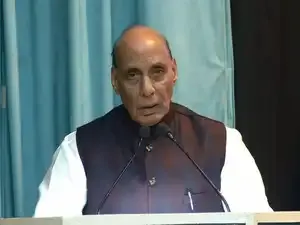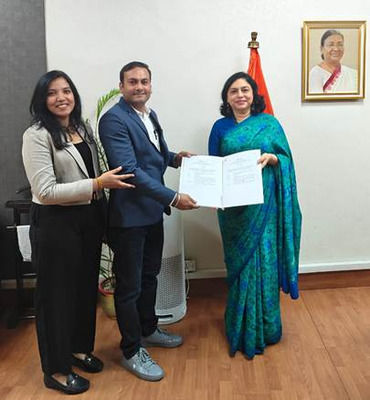Operation Sindoor will go down in history as a symbol of India's courage and restraint, Defence Minister Rajnath Singh said on Friday even as he called on the military to never underestimate the adversaries and remain alert to deal with any eventuality.
In an address to top commanders of the Indian Army in Jaisalmer, Singh urged the force to focus on information warfare, developing modern defence infrastructure, and modernisation to effectively deal with future challenges.
The defence minister described Operation Sindoor as an embodiment of India's military prowess and national character, and a demonstration by the soldiers that their strength lies not only in weapons, but also in their ethical discipline and strategic clarity.
"Operation Sindoor will go down in history as not just a military operation, but also a symbol of the nation's courage and restraint," he said.
"The action taken by our forces against terrorists was in keeping with both policy precision and human dignity. The operation isn't over. Our mission for peace will continue as long as even a single terrorist mindset remains alive," he said.
The Army commanders held detailed deliberations on key security aspects including grey zone warfare and roadmap for jointness.
Chief of Defence Staff Gen Anil Chauhan, Chief of the Army Staff Gen Upendra Dwivedi, Defence Secretary Rajesh Kumar Singh, Vice Chief of the Army Staff Lt Gen Pushpendra Singh and all Army commanders were in attendance at the conference.
The defence minister urged the commanders to continue focusing on defence diplomacy, self-reliance, information warfare, defence infrastructure, and force modernisation to ensure a future-ready Army.
He hailed the professionalism, courage, and resilience of the Indian armed forces and reaffirmed the government's unwavering commitment to provide state-of-the-art technology, infrastructure, and support to maintain the highest levels of operational preparedness.
Singh also praised the Army's role in ensuring peace and development in Jammu and Kashmir following the abrogation of Article 370. "The abrogation of Article 370 was historic. Today, the streets there are filled with hope, and not unrest."
"People are confident about their future. Most importantly, the decision-making system is now in the hands of the local people. The Indian Army has played a crucial role in this endeavour," he said.
On the situation along the northern border, Singh stated that the ongoing talks and de-escalation steps with China have demonstrated India's balanced and firm foreign policy.
"Our policy is clear that there will be dialogue and our readiness on the border will remain intact," he said.
Appreciating the will power and discipline of the soldiers, Singh described it as a testimony to the fact that the Indian military is considered one of the most adaptable forces in the world.
"Whether it's the freezing icy terrain of Siachen, or the scorching heat of the Rajasthan desert, or counter-insurgency operations in the dense forests, our soldiers have always demonstrated their capability and commitment."
"Despite the tough conditions and diverse challenges, they adapt to the changes and further strengthen national security," he said.
Singh emphasised that while present-day warfare is technology-driven, the soldiers remain the greatest assets of the country.
He stated that machines multiply strength, but it's the human spirit that possesses the power to deliver results.
Singh asserted that modern-day warfare is fought in invisible domains such as cyberspace, information, electronic disruption, and space control, and what matters, along with adapting to the latest technological advancements, is quick decision-making and willpower of the soldiers.
In an address to top commanders of the Indian Army in Jaisalmer, Singh urged the force to focus on information warfare, developing modern defence infrastructure, and modernisation to effectively deal with future challenges.
The defence minister described Operation Sindoor as an embodiment of India's military prowess and national character, and a demonstration by the soldiers that their strength lies not only in weapons, but also in their ethical discipline and strategic clarity.
"Operation Sindoor will go down in history as not just a military operation, but also a symbol of the nation's courage and restraint," he said.
"The action taken by our forces against terrorists was in keeping with both policy precision and human dignity. The operation isn't over. Our mission for peace will continue as long as even a single terrorist mindset remains alive," he said.
The Army commanders held detailed deliberations on key security aspects including grey zone warfare and roadmap for jointness.
Chief of Defence Staff Gen Anil Chauhan, Chief of the Army Staff Gen Upendra Dwivedi, Defence Secretary Rajesh Kumar Singh, Vice Chief of the Army Staff Lt Gen Pushpendra Singh and all Army commanders were in attendance at the conference.
The defence minister urged the commanders to continue focusing on defence diplomacy, self-reliance, information warfare, defence infrastructure, and force modernisation to ensure a future-ready Army.
He hailed the professionalism, courage, and resilience of the Indian armed forces and reaffirmed the government's unwavering commitment to provide state-of-the-art technology, infrastructure, and support to maintain the highest levels of operational preparedness.
Singh also praised the Army's role in ensuring peace and development in Jammu and Kashmir following the abrogation of Article 370. "The abrogation of Article 370 was historic. Today, the streets there are filled with hope, and not unrest."
"People are confident about their future. Most importantly, the decision-making system is now in the hands of the local people. The Indian Army has played a crucial role in this endeavour," he said.
On the situation along the northern border, Singh stated that the ongoing talks and de-escalation steps with China have demonstrated India's balanced and firm foreign policy.
"Our policy is clear that there will be dialogue and our readiness on the border will remain intact," he said.
Appreciating the will power and discipline of the soldiers, Singh described it as a testimony to the fact that the Indian military is considered one of the most adaptable forces in the world.
"Whether it's the freezing icy terrain of Siachen, or the scorching heat of the Rajasthan desert, or counter-insurgency operations in the dense forests, our soldiers have always demonstrated their capability and commitment."
"Despite the tough conditions and diverse challenges, they adapt to the changes and further strengthen national security," he said.
Singh emphasised that while present-day warfare is technology-driven, the soldiers remain the greatest assets of the country.
He stated that machines multiply strength, but it's the human spirit that possesses the power to deliver results.
Singh asserted that modern-day warfare is fought in invisible domains such as cyberspace, information, electronic disruption, and space control, and what matters, along with adapting to the latest technological advancements, is quick decision-making and willpower of the soldiers.





